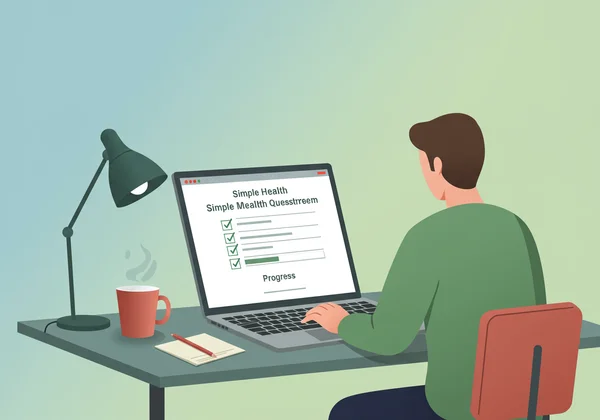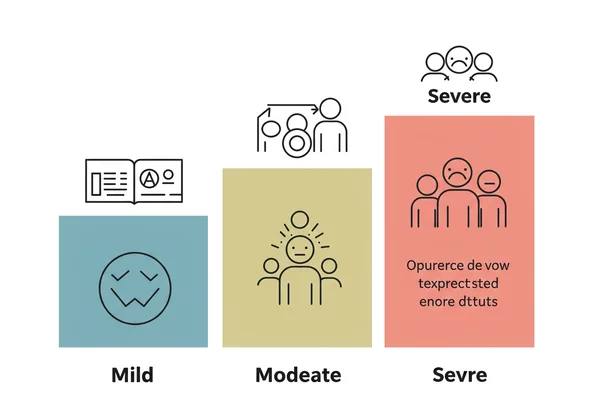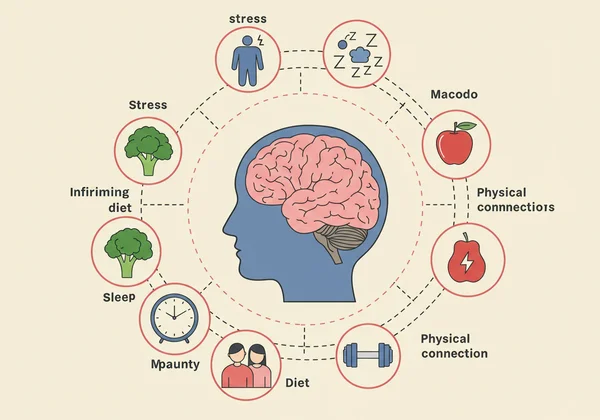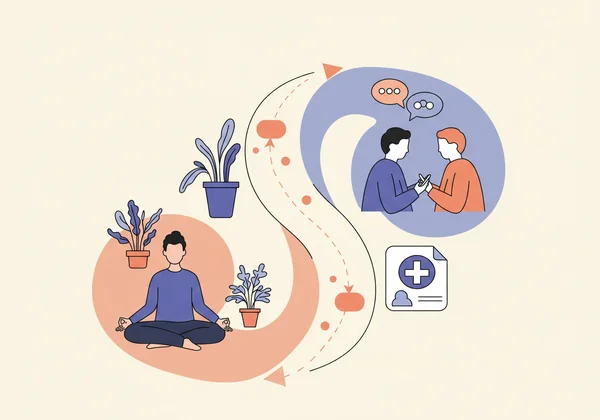Depression Test Score: What Your Results Mean & Next Steps
July 13, 2025 | By Liam Thornton
Just completed an online depression test and now you're wondering what the numbers mean? What does my depression test score mean? It's a common and important question. This guide will help you break down your depression test score, explain what different results (mild, moderate, severe) signify, and provide clear, actionable advice on the important next steps you can take for your emotional well-being. Understanding your results is the first step on your journey to greater self-awareness and improved mental health. If you haven't taken a test yet, you can start your free assessment on our platform right now.

Understanding Your Depression Test Score Ranges
When you take a depression screening test, whether it's a widely recognized tool like the PHQ-9 or another scientifically-based questionnaire, your responses are tallied to produce a score. This score then falls into a range, providing an initial indication of your current emotional state. It’s important to remember these are guidelines, not definitive diagnoses. Each range suggests a different level of potential emotional distress and might prompt different courses of action.
What a "Mild" Depression Score Indicates
A mild depression score typically suggests that while you might be experiencing some symptoms that align with depressive feelings, they are not significantly impacting your daily life or functioning. These symptoms might include occasional low mood, reduced interest in activities, or feelings of sadness that come and go. This stage is often an opportune time for proactive self-care and monitoring. It’s an invitation to reflect on your emotional well-being and identify any underlying stressors. Early intervention and increased self-awareness can often prevent these symptoms from escalating.
Deciphering a "Moderate" Depression Test Score
A moderate depression score indicates that the symptoms you are experiencing are more pronounced and may be having a noticeable impact on your daily life, relationships, or work. You might find it harder to concentrate, feel persistently sad, or experience changes in sleep patterns or appetite. This score often suggests that the symptoms are more consistent and might be causing genuine distress. Understanding a moderate depression test result is a call for deeper introspection and potentially, seeking external support. It signifies a point where the challenges become harder to manage alone, affecting your overall daily life impact.
When a "Severe" Depression Test Score is Received
Receiving a severe depression test score means the symptoms you reported are significant, pervasive, and likely having a profound impact on almost all areas of your life. This could involve persistent feelings of hopelessness, severe fatigue, difficulty performing daily tasks, or even thoughts of self-harm. A severe score is a strong indicator that you need to prioritize your mental health and seek urgent support. It’s crucial to understand that such a score warrants immediate attention from a mental health professional. Do not ignore these results; instead, view them as a critical signal to pursue professional guidance.

Beyond the Score: Interpreting Your Depression Test Results
While your numerical score provides a helpful snapshot, truly interpreting your depression test results involves looking beyond the numbers. It’s about understanding the context of your responses and what the test can, and cannot, tell you. A score is a guide, a starting point for deeper understanding, not the final word on your mental health. It helps you open a dialogue, either with yourself or with a professional, about how you’re truly feeling.
The Role of Screening Tests vs. Clinical Diagnosis
It's vital to clarify that an online depression screening test is a preliminary tool, not a diagnostic one. It’s designed to identify potential signs and symptoms that might warrant further investigation by a qualified healthcare professional. Only a doctor, psychiatrist, or licensed therapist can provide a clinical diagnosis of depression. Our online tool offers a valuable first step in assessing your emotional state, providing immediate preliminary results and a path to deeper insights. It aims to give you the information you need, encouraging you to take proactive steps on your mental health journey. You can discover your results on our platform anytime.
Factors Influencing Your Test Score
Your depression test score is influenced by a multitude of factors, and it's rarely a reflection of just one thing. Current stress levels, recent life events (positive or negative), physical health, sleep patterns, diet, and even temporary mood fluctuations can all play a role in how you answer the questions. For instance, a period of intense work pressure or personal loss might temporarily elevate your score. It’s important to consider these external factors when interpreting your results. This broader perspective helps you understand the nuance behind your score.

Your Next Steps After a Depression Test
Grasping what your depression test score means is vital, but what you do next truly makes a difference. The aim is to turn your self-assessment into concrete actions that foster your emotional well-being. Whether your score is mild, moderate, or severe, there are always constructive next steps after a depression test that you can take. Remember, taking this test is already a proactive step toward better mental health.
When to Consider Professional Support
If your depression test results indicate a moderate or severe score, or if your symptoms are significantly impacting your life, it's highly recommended to consider seeking professional support. This could involve consulting with your primary care physician, a counselor, a therapist, or a psychiatrist. They can provide a thorough evaluation, offer a diagnosis if appropriate, and discuss various therapy options such as Cognitive Behavioral Therapy (CBT) or medication if needed. Taking this step is a sign of strength and self-care. Many find immense relief and guidance from experienced mental health professionals.
Practical Self-Care Strategies to Explore
Regardless of your score, embracing self-care practices can significantly boost your emotional resilience. Simple strategies can make a big difference. Consider incorporating regular physical activity into your routine, practicing mindfulness or meditation, ensuring adequate sleep, and maintaining a balanced diet. Engaging in hobbies you enjoy, connecting with loved ones, and setting realistic goals can also contribute positively to your mood. Even small consistent efforts in stress management can lead to significant improvements in your overall outlook. You can explore more self-care resources after taking our free online test.

Tracking Your Emotional Well-being Over Time
Your emotional state is dynamic, not static. One of the most important next steps after a depression test is to track your emotional journey over time. This helps you identify patterns, understand triggers, and see the effectiveness of any strategies you implement. You can use a journal, a mood-tracking app, or even simply check in with yourself regularly. Periodically revisiting our online depression test can also provide valuable comparative insights, showing you how your feelings may have shifted. This ongoing mood tracking provides you with data about your personal progress.
Supporting Your Journey to Emotional Well-being
Taking a depression test is a courageous and important step toward prioritizing your mental health. It provides you with valuable insights, helping you to better understand your feelings and identify potential areas where support might be beneficial. Remember, our site is here to serve as a reliable, confidential, and free starting point on your journey. We provide instant preliminary results and offer the option of an AI-driven personalized deep analysis report to provide even more nuanced insights into your unique emotional landscape.
We understand that addressing mental health can feel overwhelming, but you don't have to navigate it alone. Use your depression test score as a springboard for positive change. Whether you choose to explore self-care strategies, seek professional guidance, or simply continue to track your mood, every step counts. For a deeper understanding of your emotional state and practical guidance tailored to you, start your self-assessment on our platform today. By understanding your results, you've already started a positive journey towards better emotional well-being.
Frequently Asked Questions About Depression Test Scores
What is a depression screening test?
A depression screening test is a questionnaire designed to assess for symptoms commonly associated with depression. It's a quick, preliminary tool used to indicate if you might be experiencing depressive symptoms and if further professional evaluation is recommended. It is not a diagnostic tool but rather a valuable first step in understanding your mental health. You can find a reliable one at our free tool.
Can a blood test detect depression?
No, a blood test cannot directly detect depression. Depression is a mental health condition diagnosed based on a person's reported symptoms, behaviors, and a clinical assessment by a qualified professional. While some physical health conditions can mimic depressive symptoms or contribute to them, and a doctor might order blood tests to rule out these conditions (like thyroid issues), there isn't a specific blood test for depression itself.
How to get tested for depression?
The most common way to get tested for depression is to consult a healthcare professional, such as your primary care doctor, a psychiatrist, or a psychologist. They will typically conduct a comprehensive evaluation, which may include asking about your symptoms, medical history, and mental health background. Online tools such as the one found on our site can also provide a convenient and confidential initial assessment.
How often should I take an online depression test?
The frequency depends on your individual needs and circumstances. If you're actively monitoring your mood, feeling changes, or implementing new coping strategies, taking an online depression test every few weeks or months can be beneficial to track progress. If your symptoms are severe or persistent, it's best to consult a professional rather than relying solely on repeated tests. For general well-being checks, once or twice a year can be insightful.
Is the online depression test confidential?
Yes, reputable online depression test platforms like ours prioritize user confidentiality. Your responses are typically anonymized and not linked back to your personal identity. The goal is to provide a safe and private space for self-assessment. Always check the privacy policy of any online tool you use to understand how your data is handled. We are committed to protecting your privacy.
Disclaimer: This article and the information provided by our site are for informational and educational purposes only and do not constitute professional medical advice, diagnosis, or treatment. It is not a substitute for professional mental health care. If you are experiencing severe symptoms or have thoughts of self-harm, please seek immediate help.